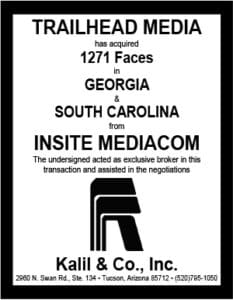
The Los Angeles Times reports that the Metropolitan Transportation Authority (Metro) has made a proposal to create the Transportation Communication Network, which could build as many as 93 digital signs across the city of Los Angeles. The program has been billed as a way to make traffic move more smoothly by providing public safety alerts and information on bottlenecks.
It also has the potential to generate $300 million to $500 million in advertising income over a 20-year span, Metro officials said.
The project description and objectives from the MTA includes:
- Incorporate features for real-time data collection to aid in traffic signal timing, microtransit data, and Metro vanpool on-demand services.
- Geographically space the multifunctional TCN Structures to expand Metro’s transportation public messaging network and ability to broadcast information to commuters in a variety of ways to further increase Metro’s visibility and accessibility for all commuters.
- Improve public safety by notifying the public of roadway improvements, road hazards, Earthquake Early Warning System notifications, Amber Alerts, and emergency situations.
- Maximize efficiency of the congested road network by promoting public awareness of travel alternatives based on geography and time constraints such as alternative routes, carpooling alternatives, and public transportation opportunities.
- Maximize advertising revenue that would be utilized by both Metro and the City to fund new and expanded transportation programs that would further Goal 2 of the Metro Vision 2028 Strategic Plan, by creating a funding source for programs to enhance experiences for all Metro users such as improving security and increasing customer satisfaction.
- Implement Goal 4 of the Metro Vision 2028 Strategic Plan by creating an avenue for regional collaboration and comprehensive, timely, and real-time information sharing across government agencies to regionally improve traffic and transportation systems.
- Reduce overall square footage of existing static off-premise displays within the City of Los Angeles.
- Locate the TCN Structures at sites, elevations, and angles that would not increase distraction to motorists while still efficiently relaying information to commuters.
Program highlights would include:
- No out-of-pocket capital costs to Metro
- Multilingual Public Safety and Emergency Messaging
- Remove approximately 200 static signs City-wide
- Revenue generation for Metro projects and City transportation projects
- All TCN Signs will be owned and controlled by Metro and conform to Metro
policies
The plan creates a 50-50 ad revenue split with an eventual private source which will build out and manage the network.
Billboard Insiders Take: This is early in the process and has been met with very mixed reviews. We will provide updates as the process moves along.
[wpforms id=”9787″]
Paid Advertisement

















